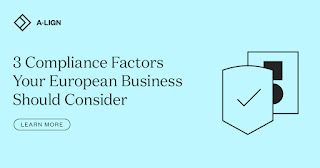How to Grow Your Business in the U.S. with Compliance
What do you get when you combine cloud technology with the current global economic conditions? The ability for organisations to expand their geographic reach to a worldwide customer base. Of course, growth isn’t that simple. With the additional business opportunities come additional IT risks.
Different regions throughout the global community have their own guidelines for assessing how organisations mitigate those risks and keep shared information secure. So, how does an organisation best meet these complex security standards? By taking a comprehensive, strategic compliance approach that takes all auditing requirements into consideration throughout the assessment process.
Security Compliance in the U.S.
The United States market presents unique challenges for European, Middle Eastern and African (EMEA) businesses as it is highly competitive with many regulatory barriers to entry, such as security compliance. Compliance reports and certifications are often used as a screening mechanism early in the sales process. Companies that cannot demonstrate compliance will struggle to make inroads into the U.S. enterprise and government market sectors.
While there are many similarities between international compliance standards, most organisations still approach the auditing process in a segmented way that fails to consider how overlapping requirements could be addressed in a consolidated, holistic approach. Rather than preparing for multiple individual audits, a more strategic approach to compliance management could help companies leverage their existing controls to meet additional criteria while saving resources and de-duplicating efforts.
How U.S. Security Compliance Standards Impact Your EMEA Business
Security compliance standards are now common practice in the U.S. and are, therefore, a cost of doing business. Many U.S.-based prospects highlight compliance requirements early in the sales process and include them in RFP/RFQs as a requirement to compete, disqualifying non-compliant firms.
EMEA organisations that want to expand into the U.S. are well-advised to begin pursuing compliance certifications. Many European organisations are already ISO 27001 (information security management) certified. So, an obvious question is why do they need to obtain other certifications? There is certainly a significant overlap between some assessment requirements, like the SOC 2, and ISO 27001 frameworks. Organisations that are already ISO 27001 certified are well–placed to work towards other compliance frameworks.
SOC 2
SOC 2 reports have become recognised as the information security baseline for selling to American businesses. To obtain a SOC 2 report, organisations must undergo an audit by an accredited Certified Public Accountant (CPA) governed by the AICPA (American Institute of Certified Public Accountants). Firms that are already ISO 27001 certified will find efficiencies across common controls with the SOC 2 framework.
SOC 1
A SOC 1 report is a prerequisite for firms whose services have a direct impact on their clients’ financial reporting objectives. No financial auditor can sign off on a client’s annual financial records unless the firm can demonstrate that its service providers have a valid SOC 1 report.
HIPAA | HITRUST
The healthcare industry in the U.S. is heavily regulated by laws regarding the security of protected health information. Compliance with HIPAA should be a priority for any vendor doing business with U.S. healthcare companies. HITRUST certification, which combines multiple federal and international regulations into a single framework, has also become increasingly important within the healthcare industry. To ensure success on your HITRUST certification look for a HITRUST CSF Assessor firm.
FedRAMP | CMMC
From managing cloud services to serving as a federal contractor, service providers with U.S. government contracts face substantial compliance requirements. Since federal compliance assessments focus on specific federal products and environments, their requirements differ substantially from enterprise-wide standards such as SOC 2 and ISO 27001. FedRAMP authorisation is required for any cloud-based service provider that does business with the U.S. federal government. CMMC certification will be required from any organisation interested in bidding on Department of Defense contracts with the U.S. To meet these requirements organisations must work with a Third-Party Assessment Organization (3PAO) for FedRAMP and a CMMC Third-Party Assessment Organization (C3PAO) for CMMC.
Read the complete article at – How to Grow YourBusiness in the U.S. with Compliance




Comments
Post a Comment